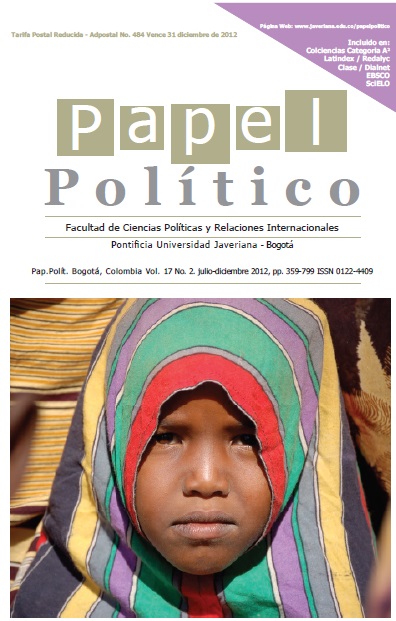Resumen
El aumento de las capacidades de poder relativo de Colombia y la percepción de un gobierno nacional que busca activar la participación del país en la escena internacional permiten confirmar lo que muchos analistas han denominado como un giro de la política exterior colombiana. La búsqueda por privilegiar el diálogo sobre la confrontación ideológica; romper con la posición tradicional de Bandwagoning con Estados Unidos; el desligue de la política exterior de los problemas internos, especialmente en el tema de guerra contra las guerrillas y la recomposición de las relaciones con los países vecinos y el retorno del país a la región latinoamericana son algunos de los elementos que lo comprueban. La política exterior de Colombia hacia la Unión Europea no ha sido ajena a esta nueva visión, aunque se pueden percibir algunas continuidades. Lo cierto es que el país busca que sean los elementos de mutuo interés los que lleven a un estrechamiento entre las partes. Es así como, teniendo en cuenta el momento crítico por el que atraviesa el bloque europeo en términos económicos y financieros y el buen ambiente minero energético del país, Colombia se centra, principalmente, en el impulso de loslazos comerciales y de inversión.
Esta revista científica se encuentra registrada bajo la licencia Creative Commons Reconocimiento 4.0 Internacional. Por lo tanto, esta obra se puede reproducir, distribuir y comunicar públicamente en formato digital, siempre que se reconozca el nombre de los autores y a la Pontificia Universidad Javeriana. Se permite citar, adaptar, transformar, autoarchivar, republicar y crear a partir del material, para cualquier finalidad (incluso comercial), siempre que se reconozca adecuadamente la autoría, se proporcione un enlace a la obra original y se indique si se han realizado cambios. La Pontificia Universidad Javeriana no retiene los derechos sobre las obras publicadas y los contenidos son responsabilidad exclusiva de los autores, quienes conservan sus derechos morales, intelectuales, de privacidad y publicidad.
El aval sobre la intervención de la obra (revisión, corrección de estilo, traducción, diagramación) y su posterior divulgación se otorga mediante una licencia de uso y no a través de una cesión de derechos, lo que representa que la revista y la Pontificia Universidad Javeriana se eximen de cualquier responsabilidad que se pueda derivar de una mala práctica ética por parte de los autores. En consecuencia de la protección brindada por la licencia de uso, la revista no se encuentra en la obligación de publicar retractaciones o modificar la información ya publicada, a no ser que la errata surja del proceso de gestión editorial. La publicación de contenidos en esta revista no representa regalías para los contribuyentes.


